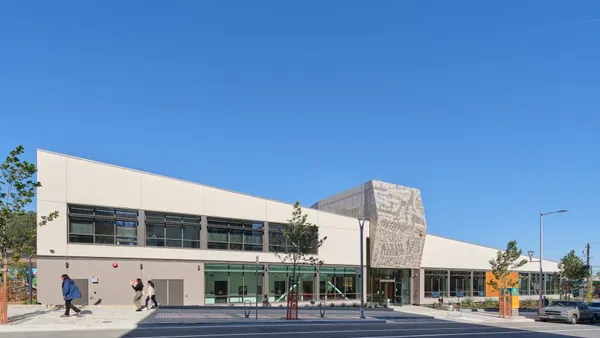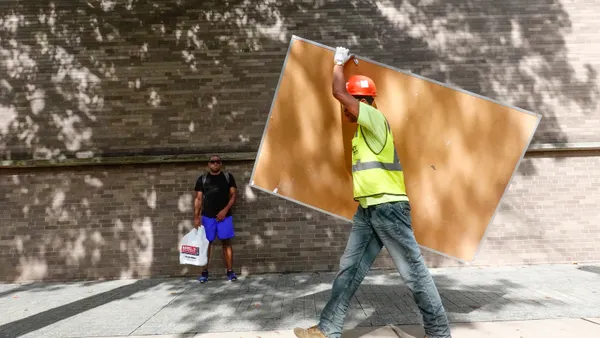Dive Brief:
- New York City Mayor Bill de Blasio announced last week that his administration has entered into new Project Labor Agreements (PLAs) with the city's building trade unions and has proposed state legislation that would require contractors working in the city to hire low-income New Yorkers and those from areas with high poverty levels. The new agreements and proposed community hiring regulations are part of de Blasio's "economic justice" agenda.
- The PLAs with the Building and Construction Trades Council of Greater New York (BCTC) contain new terms for renovation work on city-owned buildings and will serve as a template for other city agencies to use. The city has also introduced a new PLA that will cover new construction for select future projects. Both will create, according to the city, consistency in project work rules, reduce the administrative load on the agencies responsible for construction and give easier access to pre-apprenticeship and apprenticeship programs.
- As part of the community hiring program, a new Office of Community Hiring and Workforce Development will expand access to construction jobs for those in economically disadvantaged communities and authorize other city agencies like the Department of Education and Build NYC to do the same.
Dive Insight:
As part of the new PLA:
- Unions will prioritize referrals from ZIP codes where 15% or more of the population lives below the federal poverty level or are New York City Housing Authority residents, with the goal of using workers from these neighborhoods for 30% of total PLA hours worked.
- Unions will provide the maximum number of apprentices allowed by state law when a contractor requests them.
- There will be an apprenticeship Memo of Understanding that establishes pre-apprenticeship and apprenticeship goals for residents of disadvantaged communities.
- Minority- and women-owned businesses (MWBEs) will have access to greater opportunities.
De Blasio also announced that New York City is on track to award 30% of all city contracts to MWBEs by 2021 and $25 billion worth of work across all industries by 2025. The city now has 10,000 certified MWBEs, a 173.4% increase since de Blasio took office, the mayor's office said.
If approved by state lawmakers, the proposals would create approximately 1,300 construction jobs for those in low-income communities for every $1 billion in construction, according to the mayor's office. The city also projected that the new initiatives would lead to approximately $1 billion in wages and benefits for the targeted communities during the program's first year.
The mayor's announcement included praise from community and building trades leaders, but the issue of PLAs is still a divisive topic, with some construction employer groups maintaining that they inhibit fair and open competition, particularly when non-union contractors are required to adhere to PLA terms in order to take part in a project. PLA proponents say that the collective bargaining agreements are the best way to ensure that workers receive a fair wage and benefits, while also providing contractors with a steady stream of skilled labor.
Brian Sampson, president of the Associated Builders and Contractors Empire State Chapter, said he thinks de Blasio is unnecessarily politicizing the construction industry by pushing the PLA agenda.
De Blasio, he said, is aware that PLAs discourage open shop contractors from bidding on public work but Sampson maintains that those same open shop contractors hire the majority of Black and Latino workers, most of whom live in the city, according to ABC’s data.
"By implementing PLAs," Sampson said, "he is actually hurting the people he wants to help and stopping them from working prevailing wage jobs. It’s time for the mayor to support fair and open competition on all taxpayer-supported projects."
Nevertheless, the plan was heralded by many from New York City's union and legislative communities, who said it was especially timely as the coronavirus pandemic has made good-paying jobs harder to find.
“The new Project Labor Agreements will help save the city millions of dollars, establish a more efficient and effective contracting process and enhance opportunities for minority and women-owned businesses. These agreements represent an important step in ensuring that city contracts are performed by the most qualified and skilled workers, and that all these workers be treated with dignity,” said New York City Council Member Helen Rosenthal.












